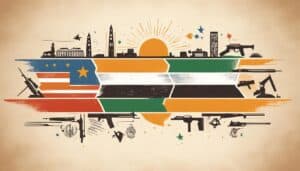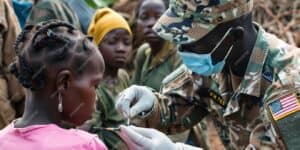
African Health Issues and Healthcare Systems – An Overview
In Africa, over 7% of people have HIV/AIDS, much higher than the world’s 1% average.1
Healthcare is a big issue, with just 7 of 54 countries meeting the 15% budget pledge from the 2001 Abuja Declaration.1 Sadly, less than 1% of the global health money goes to sub-Saharan Africa.1
There’s a gap between education and health care in Africa. Especially lacking is education for women and mothers, who protect children from diseases.
Institutions often focus on health training that doesn’t fit African needs, leading to poor health outcomes. Many villages lack good health services, even though it may seem otherwise.

Key Takeaways
- African healthcare systems face significant challenges, including a high burden of infectious diseases, maternal and child mortality, and malnutrition.
- Healthcare infrastructure is inadequate, with a shortage of facilities, limited access to essential medicines, and an insufficient health workforce.
- Fragmented and underfunded healthcare systems, coupled with inequities in access to services, hinder effective disease prevention and control.
- Traditional medicine plays an important role in African healthcare, particularly in rural areas with limited access to formal medical services.
- African countries are working to address these challenges through initiatives focused on universal health coverage, strengthening primary healthcare, and promoting public-private partnerships.
Introduction to African Health Challenges
Africa’s healthcare systems face many problems due to neglect and not enough money. This leads to big issues in health care delivery.
The top issues include not enough staff, low budget for health, and bad leadership.2
Because of these issues, Africa deals with more infectious diseases, high maternal and child mortality rates, and malnutrition than other places.
Burden of Infectious Diseases
Even though Africa has about 13% of the world’s people, it carries a 24% disease burden.1 The continent has done well in fighting infectious diseases.
It reduced malaria deaths by 66%, HIV-1 deaths by 57%, and diarrhoea deaths by 52% since 2000.3 Yet, infectious diseases are still a big challenge.
The region faces outbreaks and epidemics, worsened by COVID-19.
High Maternal and Child Mortality Rates
Africa has long struggled with high maternal and child mortality rates. Deaths among children under 5 have dropped, and people can expect to live healthier lives longer.3
But, many Africans remain very poor. This poverty adds to the ongoing crisis of health for mothers and children.
Malnutrition and Food Insecurity
Malnutrition and not having enough food are big issues in Africa.
The GDP dropped by 13% in the 1981-2001 period.1
More people ended up living on less than $1.00 a day. This problem stayed the same till 2014.1 Poverty makes the malnutrition problem worse, especially for women and children.
Inadequacies in Healthcare Infrastructure
Africa’s healthcare system has a lot of weaknesses. It lacks enough healthcare facilities, especially in the countryside.
The system mainly supports big hospitals over local clinics.2 This means many people, especially those in remote areas, struggle to get medical help.
Shortage of Healthcare Facilities
The African healthcare systems are short on healthcare facilities. This is a big challenge. It’s hard for many to get proper medical help, especially in rural places.2
A lack of clinics and hospitals means more people get sick and they can’t get the help they need. This is a big problem in Africa.
Lack of Access to Essential Medicines
Not having enough essential medicines is a problem in Africa too. The health budget is not enough, and people have to pay too much of their own money2.
This makes it hard for the poor to buy the medicine they need. As a result, many people don’t get better.
Inadequate Health Workforce
The African healthcare workforce is also lacking. There are not enough doctors and nurses.
Problems like healthcare workers leaving for other countries and strikes make things even worse2.
Solving this issue is key. It would help improve healthcare and make the system stronger.
African health issues and healthcare systems
African healthcare is struggling due to lack of funds and being spread thin.1
Only 7 of 54 countries in Africa set aside 15% for health in their budgets, like they promised in 2001.1
They depend a lot on help from outside, but even that’s not enough. This makes people pay a lot from their own pockets for medical help.1
Fragmented and Underfunded Healthcare Systems
The way African health systems are currently set up and the small amount of money they get is a big problem.2
The shortage of health workers is huge, as it accounts for over a third of the challenges.
Also, not enough money going to healthcare is a major issue, making up about 30% of the big concerns.2 Bad leadership adds to the difficulties, too.2
Challenges in Disease Prevention and Control
Africa finds it hard to keep infectious diseases under control.4 In the past decade, the number of outbreaks from animals to people has gone up by 63%.4
A big area in Africa faces meningitis outbreaks often, affecting millions of people and sometimes leading to a thousand cases in every 100,000 people.4
Marburg virus and Lassa fever are also dangers, as they have high death rates and can spread quickly.4
Inequities in Access to Healthcare Services
Getting healthcare in Africa isn’t the same for everyone.1 Even though Africa is home to 11-13% of the global population, it bears 24% of the illness burden.
However, it only gets less than a 1% share of worldwide health spending.1 The majority of people on the continent live on very little money, which makes it hard for them to pay for medical help.1
The number of people living in poverty in Africa has actually gone up over the last 20 years, unlike in other parts of the world.1
Traditional Medicine and Its Role
Traditional medicine is key in Africa’s healthcare. People there often use these methods, especially in rural areas.
This is because they may not have easy access to modern healthcare.5 Surprisingly, in places like Africa, Asia, and Latin America, most folks prefer traditional medicine.
This choice is more common than in developed areas.5
Globally, many people turn to traditional medicine. Countries like the U.S., Australia, and Canada show big numbers in its use. Even places such as Chile and Colombia find it quite important.
In some African countries, around 80% of people use these practices.6
The World Health Organization (WHO) is working to make traditional medicine safer and better.
Their program from 2014 to 2023 aims to set standards. It wants to help countries provide safe and effective traditional healing services.6
They also plan to update the International Classification of Diseases. This update will offer medical terms from various traditional medicine systems.6
In Africa, some countries are blending traditional medicine into their healthcare systems. Ghana set up a council in 2010 to handle this.
Nigeria made policies and set up boards for supervision and research. These steps focus on making traditional medicine more reliable and useful.5
The COVID-19 pandemic has underlined the role of traditional medicine in Africa. Studies look at how plants from these practices can help fight COVID-19.
Experts from Ethiopia point to the benefits of traditional medicine in battling the virus.7
Traditional medicine remains vital in Africa’s healthcare. Ensuring its safety and effectiveness is crucial. The WHO and many African nations are working towards this goal.
They are recognizing the value of traditional medicine in meeting healthcare needs.6

Health Policy and Reform Initiatives
African countries are actively working to fix problems in their health systems. They aim for universal health coverage. This means everyone can get essential healthcare without heavy costs.1
Efforts to Achieve Universal Health Coverage
Many African nations are making their primary healthcare better. They are improving care at the community level.
They do this by getting more essential medicines and training local health workers.8 At the same time, they are looking into innovative public-private partnerships.
These partnerships bring together the best of both public and private healthcare sectors.2
Strengthening Primary Healthcare
The focus is on making health services more local. This is a big part of health reforms in Africa.8 Local health teams are getting more skills and power.
They are supported by groups like WHO/AFRO. Together, they are creating training to make healthcare better in communities.8
Promotion of Public-Private Partnerships
African leaders also want to boost public-private partnerships. These partnerships bring different resources together. Their goal is to better healthcare services. They plan to improve medicine access and make the system work even better.2
Key areas of focus include universal health coverage, primary healthcare, and public-private partnerships.
Through these efforts, African countries are making big steps forward. They are tackling old healthcare problems to make their people healthier and happier.128
Conclusion
The healthcare systems in Africa are dealing with many challenging issues. They face infectious diseases, high maternal and child deaths, and a lack of proper facilities.
Plus, they struggle with not having enough staff, not enough money for health, and weak leadership.2 Even though these problems are big, African countries are trying to make things better.
Some progress has been achieved, like setting up health insurance in some countries. But the continent still sees a lot of diseases, more than its share globally.
Despite this, Africa spends very little on health. For example, it deals with lots of HIV/AIDS cases but doesn’t get enough help1.
We need many solutions to fix Africa’s healthcare. Investing more in hospitals, training more healthcare workers, and focusing on preventing diseases are crucial.2
By doing this, African countries can ensure everyone has access to good healthcare. This will not only help their people but also push the continent forward sustainably.
Related read: Exploring-the-wealth-of-african-natural-resources
Source Links
- https://www.ncbi.nlm.nih.gov/pmc/articles/PMC7123888/
- https://www.ncbi.nlm.nih.gov/pmc/articles/PMC6844097/
- https://www.nature.com/articles/s41467-024-45268-1
- https://www.weforum.org/agenda/2023/07/building-resilient-healthcare-systems-in-africa-with-a-focus-on-outbreaks-and-epidemics/
- https://www.mdpi.com/1648-9144/56/6/271
- https://www.who.int/news-room/questions-and-answers/item/traditional-medicine
- https://www.ncbi.nlm.nih.gov/pmc/articles/PMC10414097/
- https://staging.afro.who.int/sites/default/files/2017-06/dsdAFR-DHS-0301_0.pdf







